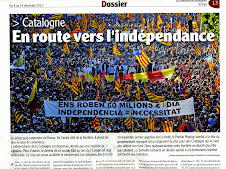As a citizen living
in Catalonia I am strongly disappointed by your last article.
It is just great
you praise American pluralism. You can be assured that at some point
in time there will be in Europe a non-white man as president or prime
minister. It is just a matter of demography. Should I mention that
the current Prime Minister of France is original from Barcelona? And,
by the way, you -still- haven't had a woman as president – with no
demographic reasons for that.
But this is not the
issue. What I would like to discuss with you is the groundless
opposition you try to make between “separatism” and “pluralism”.
Nobody living in Spain can seriously associate Catalan independence
movement with xenophobia or lack of pluralism. Please note that it's
not only democratic Spain that absorbed millions of immigrants, but
also the Catalan democratic society.
I live in a city in
Catalonia, Girona, with more than 30% of immigrants. You can see
every day small children from many different origins playing together
in playgrounds and using both Catalan and Spanish languages.
Xenophobia or racism has never been an issue in this country. Please
note that the only anti-immigrant party in Catalonia (“Plataforma
per Catalunya”) strongly opposes “separatism”. This party
hasn't obtained a single seat in our Parliament.
You
say that Spain already awards a lot of autonomy to its 17 “regions”
(here I should remark that even the Spanish constitution - approved
with the surveillance of the old regime - mentions some
“nationalities”). I think you should explain what “lot of
autonomy” means. The degree of autonomy is not measured by the
number of regions that enjoy it, but by the actual autonomy they
have.
Unlike
in the North American states or Canadian provinces, our regional
parliament cannot make important decisions in economy, justice,
education, health care, or even traffic. There are no separate levels
of government here, meaning that any decision taken by the central
government in Madrid, in the mentioned fields, has to be obeyed by
the Catalan government.
For
instance, Spain's government prepared an extremely regressive bill
against most cases of abortion. Such a law -unparalleled in almost
any democratic country in the world- will have to be obeyed in
Catalonia.
Popular
Party, now in power in Madrid, is the fourth party in Catalonia by
number of voters. But still our schools have to introduce a mandatory
subject on religion taught by Catholic priests because this party
decided so.
Spanish
central government decided to punish individual producers of
renewable energies by approving a law that favors the big Spanish
energy oligopolies. There is no action our parliament can do to
prevent that.
Back
in 2010 a Constitutional Tribunal in Madrid - ruled by PSOE and PP
members - decided to shred several articles of our Statute of
Autonomy. This law had previously been approved by the Catalan
parliament, slashed by the Spanish government, and approved by the
central parliament. What kind of democracy is this?
Most
studies, for at least the last 20 years, consider a priority to build
a railway between Valencia and the French border going through
Barcelona. Instead, the Spanish government decided to create a
network of high speed trains connecting Madrid with the periphery
provinces. This network has had a cost of over 100 billion. And the
central government still insists, against all reason, to connect
Valencia with France through Madrid using a new track going through
the mountains of Huesca.
Although
Catalan language is an “official” language in Catalonia and it is
used by seven million people, the Spanish law states that only the
language of Castilla is mandatory for labeling products, dubbing
movies or writing legal documents.
Our
model of education, approved many years ago - and still supported by
85% of the Catalan Parliament - intended to “immerse” children in
the usage of Catalan language -regardless of their origin. Recently,
a Spanish court ruled that this model is illegal and that children
should be segregated according to their language. Again, there is
nothing our parliament can do to decide in this issue.
I
am not going to insist in so many other reasonable, economic, issues
that made the Catalan independence movement grow in the last years.
In a nutshell, no civilized region in the world can afford to give up
between 8.5 and 10% of its GDP for over two decades without doing
anything against it.
You quote a
“danger” of “separatism” regarding the “change
the axis” of the political debate that puts one in the track of
“identity politics”. Then you compare the case of “separatism”
in Catalonia with the problems of Syria and Iraq. It is precisely
giving up sovereignty to an European super-state what makes the idea
of small states more plausible. Most of the campaign of unionists is
based in spreading fear of commercial boycotts or fear to having to
produce passports at state borders- something that does not occur in
the European Union anymore.
Democratic
tradition in Catalonia is quite old. And - unlike in the Middle East-
we are fortunate to live in a pluralistic society. There is a matter
of strong injustice in Spain, a state that hasn't been able to
understand its own pluralism. A democratic Europe – and democratic
America- should listen to our demands - similar to the ones your
Founding Fathers had- and realize that they can be met in a peaceful
and democratic way and -of course - preserving pluralism.































Cap comentari:
Publica un comentari a l'entrada